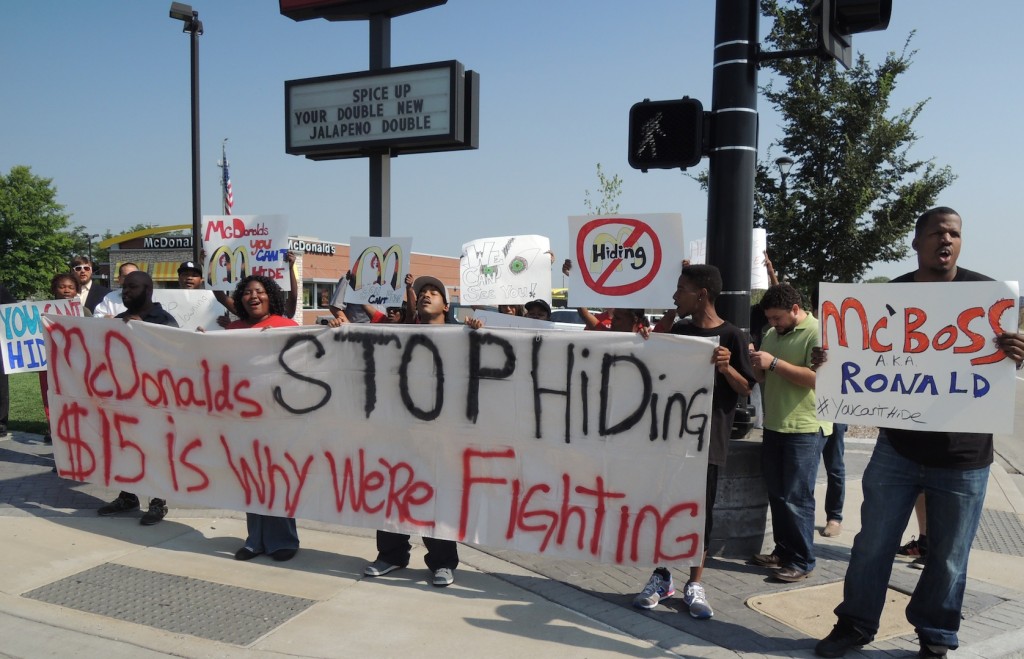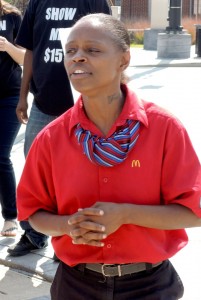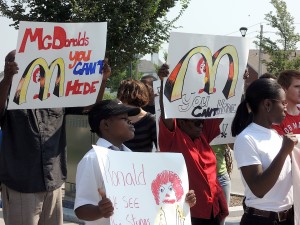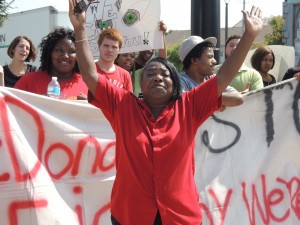Fast-food workers tell McDonald’s to stop hiding behinds its franchise owners

– Labor Tribune photos
By TIM ROWDEN
Editor
St. Louis – Fast-food workers with Show Me $15 took to the street in downtown St. Louis July 31 to tell McDonald’s to stop hiding behind its franchisees to explain away its low wages and employment decisions at its restaurants.
The rally outside the McDonalds at the corner of Tucker Blvd. and Carr St., followed a July 29 ruling by the National Labor Relations Board’s general counsel that McDonald’s plays a critical role in employment decisions at its restaurants, despite the fast-food giant’s repeated assertions to the contrary.
The move by the general counsel paves the way for cases alleging illegal activity by McDonald’s, not just its franchisees, to proceed in St. Louis and throughout the country.
About 30 fast-food workers gathered outside the McDonald’s on Tucker, chanting “Hey, McDonald’s, you can’t hide. We can see your greedy side!”

One of the workers, Rebekah Izeman, 33, a single mother who works at the McDonald’s on Tucker, joined the protest before starting her regularly scheduled shift.
“We’re here today because we need McDonald’s to stop hiding behind its franchises and pay people a livable wage. We’re asking for $15. This is my job. I work here. When I leave here, I will be going back in there and working. I would appreciate it if McDonald’s stopped hiding behind their franchises and their logos and pay us for the services that we provide to them.”
McDONALD’S IS THE BOSS
Last week’s decision followed an NLRB investigation into a myriad of complaints fast-food workers have brought in the last 20 months, accusing McDonald’s and its franchisees of unfair labor practices, including illegally firing, threatening or otherwise penalizing workers for their pro-labor activities.
Despite McDonald’s repeated assertions that its franchisees, and not the company, set wages and make other employment decisions, the NLRB’s general counsel said the $5.6 billion company is a “joint employer” and is therefore jointly libel for labor and wage violations committed by its franchise operators.
McLIES EXPOSED
“McDonald’s can try to hide behind its franchisees, but today’s determination by the NLRB shows there’s no two ways about it: The Golden Arches is an employer, plain and simple,” said Micah Wissinger, an attorney at Levy Ratner who brought the case on behalf of McDonald’s workers in New York City. “The reality is that McDonald’s requires franchisees to adhere to such regimented rules and regulations that there’s no doubt who’s really in charge.”

For nearly two years, McDonald’s and other fast-food workers across the country have been joining together and going on strike, calling for $15 and the right to form a union without retaliation. But time and time again, the company and other industry players have tried to sidestep workers’ calls, inventing a make-believe world in which responsibility for wages and working conditions falls squarely on the shoulder of franchisees.
In March, McDonald’s workers in three states filed class-action lawsuits against the company, alleging widespread wage theft. The New York Times wrote that the suits, “argue that both the corporate parent and the independently owned franchises where many of the plaintiffs work are jointly responsible for illegal pay practices carried out by the franchises…That strikes at the heart of the low-wage fast-food business model.”
‘FOR MY GRANDCHILDREN’
Phyllis Jearkins, 48, makes $8.15-an-hour working at the McDonald’s on Lindell Blvd. in St. Louis’s Central West End.

“I’m living paycheck to paycheck,” she said, while holding a sign telling McDonald’s “You can’t hide” at last week’s protest.
Low-wage jobs, like those at McDonald’s and other fast-foot franchises and retail chains, have accounted for the bulk of new jobs added in the economic recovery. Retail and fast food are among the fastest-growing sectors in the nation’s economy.
That’s not encouraging to workers like Jearkins.
“I’m out here fighting for my grandchildren,” Jearkins said. “I have 11 of them. I’m trying to establish a fund for them. I would like to see them all go to college. But I’m not going to be able to do that with the wages I make at McDonald’s. That’s why we need $15 and a union.”
[box style=”0″]
Fast-food workers vote to strike, engage in civil disobedience until they win $15 and a union
Chicago – More than 1,300 fast-food workers from across the country unanimously passed a resolution last July 26 to “do whatever it takes,” including striking and engaging in civil disobedience, to win $15 and a union.
The vote came during a two-day nationwide convention of fast-food workers, the first of its kind, outside Chicago, IL.
“The fight for $15 and a union is the civil rights struggle of today. We’re prepared to do whatever it takes, even if it involves personal risk, to win,” said Laquita Jackson, 33, who has worked at McDonald’s in Memphis, TN for 10 years and makes $8.10 an hour.
“Winning justice didn’t come easy for Martin Luther King, Rosa Parks or Cesar Chavez and it won’t come easy for us,” Jackson said. “But being at the convention, surrounded by thousands of fast-food workers just as dedicated as me, I know that we are going to win.”
Fed up with the industry’s refusal to listen to them, workers at the convention discussed strategies to escalate their campaign, which in only a year-and-a-half has changed the politics of the nation.
“When this movement started 21 months ago, people thought $15 an hour was a fantasy. They laughed at you,” said SEIU President Mary Kay Henry to a packed crowd at the convention.
“Now, because of your courage and hard work, it will become a reality. You made it a reality for workers in Seattle, for school employees in Los Angeles, for hospital workers in Baltimore. You – the fast-food worker movement – are helping to build the largest, most inclusive, most united, most determined movement for working families that modern America has ever seen.” [/box]


Leave a Reply